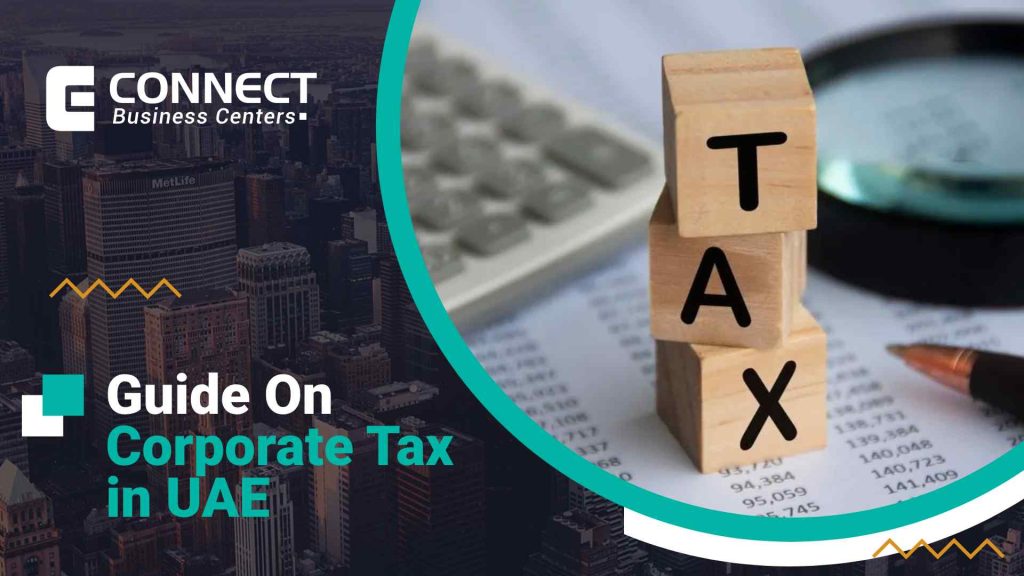The United Arab Emirates (UAE) is a leading global hub for business and investment. It has a competitive and transparent tax regime that easily adheres to international standards. In December 2022, the UAE introduced a federal Corporate Tax Law that started its application to businesses operating in the UAE from 1 June 2023. Here is everything you need to know about corporate tax in UAE.
In this article will provide an overview of the corporate tax in UAE 2023. Including its scope, rate, exemptions, registration, calculation and compliance requirements. Furthermore, we will discuss what does it mean, what comes with it and the possible advantages or disadvantages.
What is Corporate Tax in the UAE?

What is corporate tax in UAE? Summing it up, this is a form of direct tax levied on the net income or profit of corporations and other entities from their business activities. Corporate tax in UAE will apply to all businesses and individuals conducting business activities under a commercial license in the country. Including free zone businesses. Foreign entities and individuals will also be subject to corporate tax if they conduct a trade or business.
This in case if they are in the UAE in an ongoing or regular manner. Nonetheless, do not forget you might need a trade license first.
The corporate tax in UAE will not apply to businesses that engage in the extraction of natural resources. As these businesses will remain subject to the current emirate-level corporate taxation.
Furthermore, the corporate tax UAE has some exemptions:
- Individuals who earn salary and other employment income do not pay this tax.
- Those individuals who earn interest and other income from bank deposits or saving schemes do not pay this tax either.
- The same applies to individuals who invest in real estate in their personal capacity.
- The corporate tax UAE also does not apply to other exemptions. Such as dividends, capital gains and other income from owning shares or other securities in their personal capacity
Therefore, if you are looking to start a business in Dubai or the UAE you need to be familiar with corporate tax.
Corporate Income Tax
The corporate income tax rate in the UAE is 9% for taxable income above AED 375,000. The taxable income has its calculation by deducting allowable expenses from gross income. The gross income includes all income that derives from carrying on a business in the UAE. Such as sales revenue, service fees, rental income, royalties, interest income and other business income.
The allowable expenses include all expenses that incur wholly and exclusively for the purposes of the business. Such as, cost of goods sold, salaries and wages, rent, utilities, depreciation, amortization, interest expense (subject to certain limitations). Also, to marketing expenses, professional fees and other business expenses.
However, some expenses have no or partial deduction. Bribes, fines and penalties are not deductible. Donations and grants are not deductible, unless they go to a qualifying public benefit entity. Dividends and other profit distributions are not deductible either. The Corporate Tax Law imposes corporate tax, which is not deductible. Expenditure not for the business purposes is not deductible. Expenditure for deriving exempt income is not deductible. Client entertainment expenditure is partially deductible, only by 50%.
Withholding Tax
The corporate tax in UAE also introduces a withholding tax regime that requires resident persons to withhold tax at source from certain payments made to non-resident persons. The withholding tax rates are:
- The 5% for dividends
- 10% for interest
- The 10% for royalties
- 10% for service fees
The withholding tax applies only if the payment is made to a non-resident person who does not have a permanent establishment in the UAE. Or who has a permanent establishment in the UAE but the payment is not effectively connected with that permanent establishment.
Furthermore, the withholding tax does not apply if the payment is made to a resident person of a country that has a double tax treaty with the UAE. One that provides for a lower withholding tax rate or an exemption from withholding tax.
The resident person who makes the payment is responsible for withholding and remitting the tax to the Federal Tax Authority (FTA). This is done within 15 days from the end of the month in which the payment is made. The resident person must also file a withholding tax return with the FTA within 30 days from the end of each quarter.
Capital Gains Tax
The corporate tax in UAE 2023 does not impose a separate capital gains tax on gains derived from the disposal of assets. Instead, such gains are included in the gross income and are subject to corporate income tax at 9%. This is one of the benefits of having a company within a business center in Dubai or the UAE.
However, there are some exemptions for capital gains earned by a resident person from its qualifying shareholdings. Or, from qualifying intra-group transactions and reorganizations.
A qualifying shareholding is one of at least 10% in another resident or non-resident person that engages in business. A qualifying intra-group transaction or reorganization is a transaction or reorganization between two or more resident persons that are members of the same group of companies (at least 75% ownership) and that meets certain conditions.
Types of Corporate Taxes Levied in the UAE
The corporate tax in UAE consists of two types. There are the federal corporate tax and the emirate-level corporate taxation.
The federal corporate tax is imposed by the Corporate Tax Law and applies to all businesses operating in the UAE. Except those that engage in natural resource extraction. At a rate of 9% on taxable income above AED 375,000.
Additionally, the emirate-level corporate taxation is imposed by each emirate and applies only to businesses engaged in natural resource extraction. Such as, oil and gas at varying rates depending on the type of activity and the emirate. The emirate-level corporate taxation will continue to apply alongside the federal corporate tax.
How to Register for Corporate Tax in the UAE
How to register for corporate tax in UAE? We will explain it carefully. All businesses that are subject to corporate tax in UAE must register with the FTA within 30 days. They must do it from the date they become liable for corporate tax. You can do your corporate tax UAE registration online through the FTA website. There you can provide the necessary information and documents, such as:
- Trade name and legal form of the business
- Commercial license number and issuing authority
- Contact details and address of the business
- Financial year end of the business
- Nature and scope of the business activities
- Estimated annual turnover and taxable income of the business
- Bank account details of the business
- Details of any associated persons or permanent establishments of the business
Moreover, the FTA will issue a tax registration number (TRN) to the registered business. Which must be used in all communications and transactions with the FTA.
How to Calculate Corporate Tax in the UAE
How to calculate corporate tax in UAE? You apply the tax rate of 9% to the taxable income of the business. Therefore, the taxable income is calculated by deducting allowable expenses from gross income. The gross income includes all income derived from carrying on a business in the UAE.
The allowable expenses include all expenses that incur wholly and exclusively for the purposes of the business. For example, cost of goods sold, salaries and wages, rent, utilities, depreciation, amortization and, interest expense (subject to certain limitations). Furthermore, the marketing expenses, professional fees and other business expenses also need to be part of the calculation.
You can calculate corporate tax by following these steps:
- Deduct your allowable expenses from your gross income to get your taxable income. You can deduct expenses that you incur only for your business. Such as salaries, rent, utilities, depreciation, etc. Also, you can deduct only half of some expenses, such as interest and entertainment.
- Multiply your taxable income by the corporate tax rate. If your taxable income is AED 375,000 or less, you pay no corporate tax. If your taxable income is more than AED 375,000, you pay 9% of the amount above AED 375,000 as corporate tax.
- Subtract any tax credits or reliefs that you qualify for. Tax credits or reliefs are incentives that lower your corporate tax. Such as, double taxation relief, investment allowance, research and development credit, etc.
- Add any withholding tax that you owe. Withholding tax is a tax that you deduct from payments that you make to non-residents for certain types of income, such as interest, royalties, dividends, etc. The withholding tax rate is 10% unless a double tax treaty specifies a lower rate.
- The result is your corporate tax payable for the financial year.
Conclusion
The corporate tax in the UAE means to be competitive and transparent, with a low rate of 9% on taxable income above AED 375,000. Additionally, the corporate tax in the UAE also introduces a withholding tax regime on certain payments made to non-resident persons.
Moreover, the corporate tax in the UAE provides some exemptions and incentives for certain types of income and transactions. However, the corporate tax in the UAE requires businesses to register with the FTA, calculate their taxable income and pay their tax liability in advance installments and file a corporate tax return. The corporate tax in UAE is looking to enhance the nation’s position as a leading jurisdiction for business and investment.

However, if you need help with calculating your corporate tax, please contact us today for more information.
Connect Business Centers
![]() Connect Business CentersConnect business centers is a real estate marketplace dedicated to helping homeowners, home buyers, sellers, renters and agents find and share information about homes, real estate and home improvement.
Connect Business CentersConnect business centers is a real estate marketplace dedicated to helping homeowners, home buyers, sellers, renters and agents find and share information about homes, real estate and home improvement.




